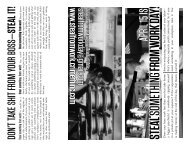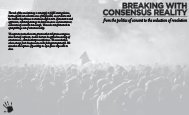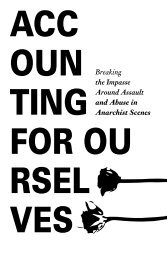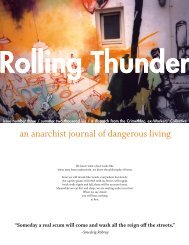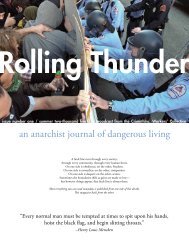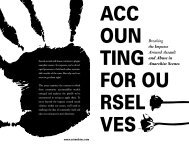HEiST! - CrimethInc
HEiST! - CrimethInc
HEiST! - CrimethInc
Create successful ePaper yourself
Turn your PDF publications into a flip-book with our unique Google optimized e-Paper software.
a janitor at a recording studio – or of the fedup<br />
employee at an animal testing corporation<br />
who smuggled in a camera one day and got<br />
the whole place shut down. There are plenty<br />
of things to steal from work besides cash and<br />
condiments.<br />
In theoretical terms, capitalists and socialists<br />
alike have always looked at work as something<br />
that produces value. Workers have to consider<br />
a different possibility – that working uses<br />
up value. That’s why the forests and the polar<br />
ice caps are being consumed, the same as the<br />
hours of our own lives: the aches in our bodies<br />
when we come home from work parallel the<br />
damage occurring on a global scale. Everything<br />
ends up on the market, costing more and more<br />
but meaning less and less.<br />
In the long run, perhaps the most valuable<br />
thing anyone could steal from work is the realization<br />
that there are better things to do with<br />
one’s life than sell it away. Millions of workers<br />
know this already, but as a society we have yet<br />
to act on this knowledge.<br />
What would you say to people who would turn in a co-worker for<br />
stealing<br />
The universal moral prescription against theft<br />
is intended to protect the collective interests of<br />
humanity against individual thieves. Ironically,<br />
when an employee turns in a coworker for theft,<br />
that prescription ends up protecting the individual<br />
interests of a few employers against the collective<br />
interests of their employees, whose labor<br />
it is that produces the wealth they hoard in the<br />
first place. So even though it may be intended<br />
to preserve fairness, turning in a coworker for<br />
stealing can actually accomplish the opposite<br />
– it’s the equivalent of informing on freedom<br />
fighters struggling against a dictatorship.<br />
The power that enables employers to exploit<br />
employees doesn’t just come from inequalities<br />
of wealth; it is maintained by the part of every<br />
worker that identifies with employers’ interests<br />
In the final analysis, stealing from our workplaces<br />
is not a rebellion against the status quo,<br />
but simply another aspect of it. It implies a profound<br />
discontent with our conditions, yes, and<br />
perhaps a rejection of the ethics of capitalism;<br />
but as long as the consequences of that discontent<br />
remain individualized and secretive, they<br />
will never propel us into a different<br />
world. Stealing from work is what<br />
we do instead of changing our<br />
lives – it treats the symptoms,<br />
not the condition. Perhaps it<br />
even serves our bosses’ interests<br />
– it gives us a pressure<br />
valve to blow off<br />
steam, and enables<br />
us to survive to work<br />
another day without<br />
a wage increase.<br />
Perhaps<br />
they figure the<br />
costs of it into<br />
their business<br />
plans because<br />
they know our<br />
stealing is an inevitable<br />
side effect of<br />
exploitation – though<br />
not one guaranteed to<br />
bring exploitation to an<br />
end.<br />
On the other hand, the<br />
notion that stealing from<br />
our employers is not relevant<br />
to labor struggle<br />
enforces a dichotomy between<br />
“legitimate” workplace<br />
organizing on the one<br />
hand and individual acts of




